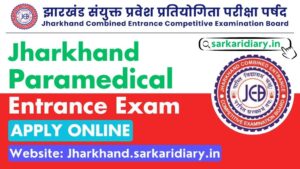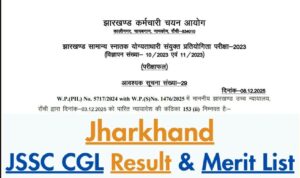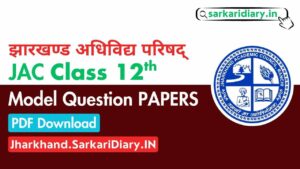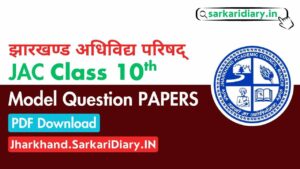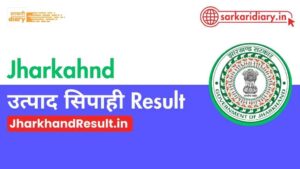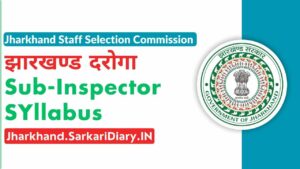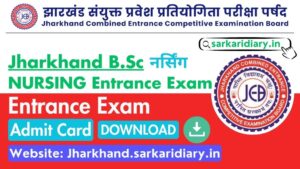Jharkhand JCECE SYllabus 2025: Jharkhand Combined Entrance Competitive Examination (JCECE) is a state-level entrance exam conducted by the Jharkhand Combined Entrance Competitive Examination Board (JCECEB) for admissions to various undergraduate professional courses. Aspiring students who wish to pursue courses in agriculture, veterinary science, fisheries, engineering, and other related fields can appear for this exam. This article provides a detailed overview of the JCECE 2025 syllabus, exam pattern, and other important details to help candidates prepare efficiently.
Overview of Jharkhand Combined Entrance Competitive Examination (JCECE) 2025
![Jharkhand Combined Entrance Competitive Examination (JCECE) 2025 [Syllabus & Exam Pattern]](https://jharkhand.sarkaridiary.in/wp-content/uploads/2025/04/Jharkhand-Combined-JCECEB-Agriculture-Allied-SYllabus.jpg)
The JCECE 2025 will be conducted for students who are interested in taking up undergraduate courses in different streams, including Physics, Chemistry, Mathematics (PCM), Physics, Chemistry, Biology (PCB), and Physics, Chemistry, Mathematics, Biology (PCMB).
Key Details of JCECE 2025:
- Exam Name: Jharkhand Combined Entrance Competitive Examination (JCECE) 2025
- Conducting Body: Jharkhand Combined Entrance Competitive Examination Board (JCECEB)
- Mode of Examination: OMR-Based (Offline)
- Duration of Exam:
- PCM Group: 3 hours
- PCB Group: 3 hours
- PCMB Group: 4 hours
- Syllabus Standard: 12th Class (or Equivalent)
- Purpose: Admission to various undergraduate professional courses like B.Sc. (Hons) Agriculture, B.Tech (Agriculture Engineering), B.V.Sc, etc.
Candidates can download the complete syllabus and other essential details in PDF format from the official JCECEB website.
JCECE 2025: Detailed Course List
The JCECE 2025 is divided into three main streams, with each group offering a range of undergraduate courses:
1. PCM Group (Physics, Chemistry, Mathematics):
For candidates who are interested in pursuing courses related to agriculture, forestry, and engineering:
- B.Sc. (Hons) Agriculture
- B.Sc (Hons) Forestry
- B.Tech (Dairy Technology, Agriculture Engineering)
2. PCB Group (Physics, Chemistry, Biology):
This group is suitable for those pursuing courses related to biology, veterinary sciences, and fisheries:
- B.Sc. (Hons) Agriculture
- B.Sc (Hons) Forestry
- B.V.Sc and A.H.
- B.H.M.S.
- B.F.Sc (Bachelor of Fisheries Science)
3. PCMB Group (Physics, Chemistry, Mathematics, Biology):
This comprehensive group includes all subjects for a wider range of professional courses:
- B.Sc. (Hons) Agriculture
- B.Sc (Hons) Forestry
- B.V.Sc and A.H.
- B.H.M.S.
- B.Tech (Dairy Technology)
- B.F.Sc (Bachelor of Fisheries Science)
JCECE 2025: Exam Pattern
The JCECE 2025 will be conducted in an offline mode using the OMR sheet. The exam consists of multiple-choice questions (MCQs) in three major groups: PCM, PCB, and PCMB. Below is the detailed breakdown of the exam pattern for each group:
1. PCM Group:
| Subject | No. of Questions | Marks |
|---|---|---|
| Physics | 50 | 50 |
| Chemistry | 50 | 50 |
| Mathematics | 50 | 50 |
| Total Marks | 150 | 150 |
- Note: Each question carries 1 mark. A negative marking of ¼ mark is applied for incorrect answers.
2. PCB Group:
| Subject | No. of Questions | Marks |
|---|---|---|
| Physics | 50 | 50 |
| Chemistry | 50 | 50 |
| Biology | 50 | 50 |
| Total Marks | 150 | 150 |
- Note: There will be no negative marking for unanswered questions.
3. PCMB Group:
| Subject | No. of Questions | Marks |
|---|---|---|
| Physics | 50 | 50 |
| Chemistry | 50 | 50 |
| Mathematics | 50 | 50 |
| Biology | 50 | 50 |
| Total Marks | 200 | 200 |
- Note: Multiple answers to a single question will lead to negative marking.
JCECE 2025: Detailed Syllabus for Each Subject
The syllabus for the JCECE 2025 is designed based on the 12th-grade syllabus or its equivalent. Below is an outline of the important topics for each subject in the PCM, PCB, and PCMB groups.
1. Physics:
Key Topics:
- Introduction & Measurement
- Motion in One Dimension and Two Dimensions
- Laws of Motion
- Work, Energy & Power
- Mechanics of Solids & Fluids
- Gravitation
- Heat & Thermodynamics
- Oscillations & Waves
- Electrostatics
- Current Electricity
- Magnetic Effects of Current & Magnetism
- Electromagnetic Waves
- Optics
- Atomic Nucleus & Dual Nature of Matter
- Semiconductor Devices
Most Important Topics:
- Atoms & Nucleus
- Oscillations & Waves
- Rotational Motion
- Electrostatics
- Magnetic Effects of Current
2. Chemistry:
Key Topics:
- Basic Concepts & Atomic Structure
- Chemical Bonding & Molecular Structure
- Periodic Properties
- S-Block Elements & Metallurgy
- P-Block Elements
- Thermodynamics & Chemical Equilibrium
- Solutions & Redox Reactions
- Organic Chemistry: Hydrocarbons, Organic Reaction Mechanisms
- Coordination Compounds
- Biomolecules & Environmental Chemistry
Most Important Topics:
- Atomic Structure & Bonding
- Periodic Table & S-Block Elements
- Organic Reaction Mechanisms
- Biomolecules
3. Mathematics:
Key Topics:
- Sets, Relations & Functions
- Complex Numbers & Quadratic Equations
- Sequence & Series
- Permutations & Combinations
- Matrices & Determinants
- Trigonometry & Cartesian Coordinates
- Calculus (Differentiation & Integration)
- 3D Geometry & Vectors
- Statistics & Probability
Most Important Topics:
- Calculus & Differentiation
- Permutations & Combinations
- Matrices & Determinants
4. Biology (for PCB & PCMB Groups):
Key Topics:
- Diversity in the Living World
- Cell & Cell Division
- Physiology of Plants & Animals
- Reproduction & Development
- Ecology & Environment
- Biotechnology & Genetic Engineering
- Genetics & Evolution
- Biodiversity & Conservation
Most Important Topics:
- Genetics & Biotechnology
- Physiology of Animals
- Ecology & Environment
Preparation Tips for JCECE 2025
- Know the Syllabus and Exam Pattern: Familiarize yourself with the syllabus and exam pattern for your chosen group (PCM, PCB, or PCMB). Focus on the important topics outlined above.
- Time Management: Given that the exam duration varies across groups, plan your time accordingly. Ensure that you allocate time for each subject and stick to the schedule.
- Practice Previous Year Papers: Solve past year question papers to understand the exam pattern and improve your problem-solving speed.
- Mock Tests: Take regular mock tests to assess your preparation and improve your accuracy.
- Study Resources: Refer to NCERT textbooks and other state-level or national-level reference books for comprehensive understanding.
Conclusion
Stay updated with official announcements from JCECEB and ensure timely application submission. Best of luck with your preparations!
